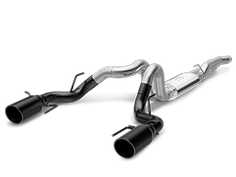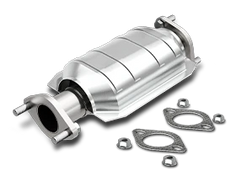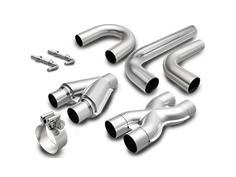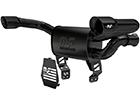Why Do I Need a Catalytic Converter?
Whether you’re talking about a reliable delivery truck, a fancy new Ferrari or a clapped-out Ford Focus, all commercial and personal vehicles sold in the United States since 1975 feature at least a single catalytic converter as a standard part of their exhaust systems. Read on to find out the three main reasons why these seemingly mundane emissions devices are so important, and why your vehicle absolutely needs one.
Environment
First, the primary purpose of a vehicle’s catalytic converter is to improve emissions by breaking down harmful chemical compounds produced as part its engine’s normal combustion cycle. These include undesirable molecules such as hydrocarbons, carbon monoxide, nitric oxide and nitrogen dioxide to name a few. Ask anyone what big cities were like before the advent of the automotive catalytic converter and prepare to be regaled with stories of pollution-choked metropolitan areas, tall buildings peeking up above the smelly haze and kids in some areas even getting days off school on particularly bad “smog days.”
The facts speak for themselves. For example, according to the EPA’s National Summary of Air Quality, carbon monoxide levels have dropped 81% from 1980 to 2020. Annual nitrogen dioxide levels dropped 67% over the same period.* Similarly, carbon monoxide and sulfur dioxide are both down 81% and 94% respectively. In fact, smelling sulfur (that rotten egg smell) coming from a tailpipe indicates that either the vehicle’s catalytic converter needs to be replaced, or that it doesn’t even have one installed.
Safety
Catalytic converters improve vehicle safety as an extension of their primary function: catalyzing and thereby reducing harmful emissions. Without one, there is nothing to protect you, your passengers or innocent passersby from ingesting dangerous compounds such as carbon monoxide. Unlike some chemicals such as sulfur, which can be detected by scent, carbon monoxide is invisible, tasteless and odorless—yet extremely deadly.
According to the Mayo Clinic, side effects of carbon monoxide poisoning vary depending upon the length and degree of exposure, but can include permanent brain damage, damage to your heart (including life-threatening cardiac complications down the road), fetal death or miscarriage and death.* In closed or partially closed spaces such as parking structures and garages these compounds pose extra risk to anyone in or around a vehicle operating without a properly functioning catalytic converter installed. While we wouldn’t recommend hanging out in tight spaces with running vehicles even if they have converters installed, the exposure to dangerous chemicals in such cases is reduced by orders of magnitude when a converter is present.
Legality
Finally, in addition to environmental and safety concerns, another reason you absolutely need a catalytic converter is because you’re required to have one by law. That is, provided your vehicle originally had one to begin with. Please don’t make the mistake of thinking you can get away with it, either. An astute law enforcement officer will be able to tell that something is off with your ride when it sounds uncharacteristically like a straight-pipe street racer and smells like sulfur. By then it’ll be too late, and you’ll be facing a hefty fine (of up to $2,500 in especially strict states such as California).
Moreover, it’s just not worth it. Folks primarily tamper with or remove their converters with the goal of increasing performance by allowing exhaust gases to flow through the system more freely. While this makes sense in principle and was true of early catalytic converters (which is why horsepower numbers on new vehicle models went down significantly in the years after converters were first introduced) this is simply no longer the case.
It’s been decades since engineers figured out how to design effective exhaust systems while incorporating the required catalytic converters. We know from our own testing at the MagnaFlow Tech Center that the presence (or absence) of a catalytic converter makes no meaningful difference as far as performance is concerned. In other words, running your car or truck without a catalytic converter is all risk and no real reward.
Will my car work without a catalytic converter?
Yes, technically, but please don’t. Your vehicle will sound like you’ve illegally modified it and leave a trail of pollution that smells like rotten eggs wherever you go. It’s not worth the damage caused to the environment, your health, the health of others and the fact that you will likely get busted by the cops.
Remember, there’s no payoff here. As mentioned before, there really isn’t any extra power to be found by tampering with your catalytic converter or removing it altogether. It just doesn’t make any sense. Please leave your converter alone until the time comes to replace it.
When that time does come, all you need to do is come back to MagnaFlow.com, where we offer direct-fit, manifold and universal catalytic converters for most production vehicles. On MagnaFlow.com you can use our Shop by Vehicle tool, which lets you track down the exact catalytic converter you need by year, make, model, trim level and local emissions compliance. Have questions about our products? Give us a call at 1-800-990-0905 and we’d be happy to help.
Sources:
Air Quality - National Summary | US EPA
Carbon monoxide poisoning - Symptoms and causes - Mayo Clinic
















Comments